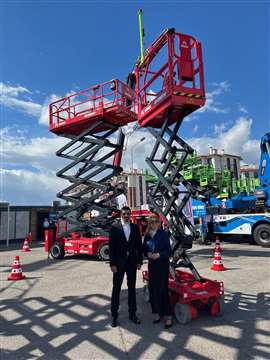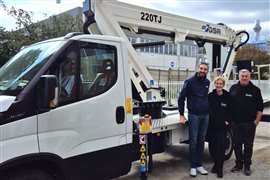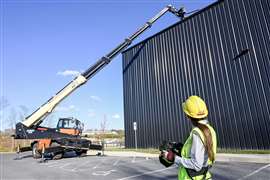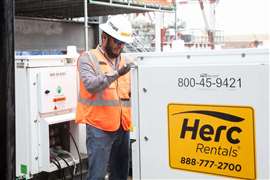Read this article in Français Deutsch Italiano Português Español
Report: the rise of Turkey’s MEWP rental sector
28 October 2025
The access rental market in Turkey is in a transitional stage as it moves towards greater maturity, and also offers the prospect of substantial growth over the next five years. But there are challenges, including the economy and competition from new entrants from both the manufacturing and rental sectors.
One of the key challenges for the entire country is the high rate of inflation, which currently stands at around 33%. Abdullah Tuncer, the founder and Secretary General of Turkey’s access equipment association, Platformder, says this is down to three factors: the Turkish Lira has weakened sharply, making imported goods and energy much more expensive; rapid wage increases, high public spending and rising production costs have kept prices high; and finally, low interest rates and unpredictable government policy decisions has weakened confidence, so people and firms expect prices to keep rising. This, says Tuncer has fueled a self-reinforcing inflation cycle.
All this is amid a highly compettive rental matket, which has seen new rental companies springing up to take advantage of low equipment prices and long repayment deals offered by manufacturers entering the country from China.
“The Turkish rental market is difficult. Rental prices are low and competition is very high,” says Tuncer.
 From left: Fatih Aydin, President, AVK; Kenin Aydin, President of Fatih Vinc; Isil Çataltepe, Manager, Istanbul Vinc; Abdullah Tuncer, General Secretary, Platformder; Saruhan Gunaydin, President, Toro Machinery
From left: Fatih Aydin, President, AVK; Kenin Aydin, President of Fatih Vinc; Isil Çataltepe, Manager, Istanbul Vinc; Abdullah Tuncer, General Secretary, Platformder; Saruhan Gunaydin, President, Toro Machinery
Despite the economic challenges, the MEWP sector has the advantage that it is still very young, having effectively started around 2000 and grown quickly to 35,000 machines, of which 30,000 are in rental fleets.
Most of these units are spread thinly among the fast-growing number of rental companies that are springing up to take advantage of low-cost equipment and payment deals. In addition, many new rental companies are not necessarily complying with the traditional norms of the sector among the larger, established firms, including sensible rental rates and re-rents, among others.
Tuncer adds, “The larger rental companies have a common interest, but these smaller companies are affecting the market negatively.”
How many rental players?
The number of rental companies in the country now stands at around 300, says Tuncer, with an average fleet size of 60 – 100 units. However, there are a growing number of startups with fleet numbers as low as 10, thanks to the enticement of long payment terms - anything up to 18 months or more - from competitors that have entered the market over the last couple of years, particularly from China.
In Turkey, there are just four rental companies with fleets over 1,000 units; Istanbul Vinc, Rent Rise, Fatih Vinç and the largest, MRT Makina, with around 2500 units, and Tuncer believes the fleet sizes of the country’s biggest providers will grow considerably over the next few years.
Isil Çataltepe, manager at Istanbul Vinc, who oversees its fleet of 1,200 units, echoes Tuncer’s thoughts, “Small companies have started to buy equipment with low repayment deals, which has pushed down prices overall.
“Also, inflation in the country has gone up but rental prices have gone down, so the market is not profitable - over the last three to four years prices for food and petrol have tripled due to inflation.”
Then there is China’s largest rental company Horizon, which has more than 200,000 MEWPs in its total fleet and has turned its sights on Turkey, among other world markets, where it has been active for 1.5 years and now operates a fleet of 1,000 units, making it among the country’s largest domestic renters.
Tuncer says the MEWP population in the country could reach 80,000 units over the next half decade, with the top five to six rental companies having fleets of 5,000 to 6,000 units by then.
It is not just the smaller rental companies that are partnering with Chinese OEMs, however.
AVK makes supplier switch
AVK is one of the larger renters in the country. Its president Fatih Aydin is also vice president of Platformder. The company has grown its fleet massively in recent months, and now offers more than 600 units, 90% of which are Zoomlion machines.
Essentially the company’s fleet size has grown 45% since January, a big rise for a company that started out as a truck mount specialist, turning to self-propelled MEWPs eight years ago, then taking the decision to focus on one brand, leading to the recent deal with Zoomlion. “We sold our existing equipment and have become a Zoomlion specialist,” said Aydin. It also means the company’s fleet has become very young in the same period of time, from an average age of 10 previously.
He says, “Because of the high inflation in the country, government investment has stopped but there is still growth in the public sector. However, market conditions in the second half of the year are likely to improve.”
And as Aydin goes on to say, AVK will be able to make the most out of its transformed business model as the economy becomes more positive over the next five years.
“The MEWP sector in Turkey is relatively young and this equipment will continue to penetrate the market.”
 QuadroMac is Hered’s new distributor in Turkey. It is launching the 50507H mini scissor into the market.
QuadroMac is Hered’s new distributor in Turkey. It is launching the 50507H mini scissor into the market.
Board member of Istanbul-based Toro Machinery and president of Platformder Saruhan Gunaydin, has also noted the influence of new competitors entering the market through lower cost equipment but recognizes the increase in performance of the equipment.
The 17-year-old company has 345 MEWPs in its fleet including Haulotte, Genie, JLG, LGMG and Zoomlion units, but Gunaydin adds, “The Chinese brands are growing due to price, quality and finance.”
Fatih Vinc is one of the country’s largest rental companies with a fleet of 2,200 units, mainly MEWPs, alongside 30m truck mounted platforms, five telehandlers and 150 forklifts.
The company has invested significantly this year, with additions to the fleet from Sinoboom, Dingli, Zoomlion and Haulotte and is the first owner in Turkey of Dingli’s 44m working height hybrid BT44HRT telescopic boom, which is now the second largest MEWP in the country.
Fatih Vinc will continue to invest in booms as it believes the scissor lift market is saturated. As the company points out scissor lifts account for around 80% of the Turkish MEWP market. “So, we are stopping our investment in scissor lifts and moving more into booms where there is growth.”
One of the Chinese manufacturers to have entered the market is Hered, through its new distributor QuadroMac. Established four years QuadroMac has focused on excavators and now also provides spare parts, after sales service for MEWPs and is one of only four IPAF training centers in the country.
The company had been searching for an exclusive dealer partnership with a MEWP OEM and settled on Hered. “It’s a growing company and the products clearly have a good reputation in the industry,” said QuadroMac’s General Manager Erhan Küçük. “And they were open to adapting the equipment due to customer requests in Turkey.”
But Chinese manufacturers and their distributors are not immune to the challenging market conditions in the country. And as Küçük explains not all Chinese manufacturers have low finance options as part of their business model. “The market is changing every day,” says Küçük. “There rental markets are growing but the profits are not there as a lot of global brands are offering long term finance deals, which means rental companies are offering low rental rates.”
Küçük goes on to explain, “We are offering a different service. Many are coming in with low cost equipment but we are offering more. We are not looking at big profits straight away, and Hered is supporting us in that.”
An example of how the Turkish MEWP market has specific requirements, comes from Hered’s latest scissor lift, which was on show on QuadroMac’s stand for the first time.
The 50507H mini scissor is fully hydraulic rather than electric drive. The hydraulic option was chosen as the company says most other models on the market are electric drive, yet many customers are requesting a hydraulic option. Küçük argues that hydraulic units are easier to fix onsite in the event of a breakdown, avoiding the need to call out specialist technicians.
With the right business plan there is plenty of opportunity for growth in the country, adds Küçük. While scissor lifts dominate the market, new applications for them are being found in industry and other sectors, such as retail and maintenance, as they become educated in the benefits of access equipment.
“The market is not saturated overall. We know all the key accounts and what they can do, plus there are other cities across Turkey where access equipment is not yet commonly used.”
Accompanying that rise Küçük sees sales slowing to end user buyers with the rental sector rising. The economy has hit spending in the construction sector, which means firms have avoiding investment in new equipment. “And if a construction company does not buy then will rent, as they still need the equipment.”
Küçük adds, “Also, there is a lot of infrastructure like hospitals using small scissors and this will grow the rental market too. And if the economy remains stable, it will start to grow again in general next year.”
Focus on access equipment
Further to that, rental companies will focus on access equipment, rather than moving directly into generalist rental. “Specialist AWPs rental will grow because it’s still a young market, [and that is how young access markets develop]. Another big change in the market is service and maintenance that is developing through rental - this will make it even stronger.”
Turkish scissor manufacturer Galen has also identified the needs of a young and growing access access market, with products that are designed for low maintenance. The company has produced excavator buckets for the last 25 years and has been a Komatsu after sales service agent for 20 of those years.
It started R&D on scissor lifts three years ago and at the show had the 10m platform height ES1012 for the first time. It has one cylinder on the scissor stack to provide less maintenance requirements.
The company is also using its experience in forklifts and electric PMSM motors to produce its electric powered scissors, and has no plans to manufacture diesel equipment going forward. The machines are designed to be simple to use and maintain with a range of operator-friendly features like easy access components - for example, the ECU control system is on the back of the scissor base for unhindered access.
Galen is now opening a new factory in Ankara with laser welding and painting facilities. It is set to be production ready over the next two months with capacity for 500 scissor lifts per year. Next up will be 12m platform height lifts, while R&D for RT machines is underway.
Ogeday Yildiz, who overseas research and development at the company, said, “There is a lot of pressure in the market from competition. But people know our quality. We can offer comprehensive service based on the fact we have experience with Komatsu, which makes the difference.”
The strategy is to expand locally around its Ankara headquarters, then spread out to the rest of Turley followed by international sales.
“The economy is actually good,” adds Yildiz, “with the exception that all customers are price orientated. At the moment it does not help that there are no regulations for working at height.
 Vesa entered the truck mount market two years ago and has launched the a 53m model - the largest from any domestic producer.
Vesa entered the truck mount market two years ago and has launched the a 53m model - the largest from any domestic producer.
“When regulation does happen, then that will change the sector, as industry and many end users will be required to use it, as they stop using ladders. For example, our factory did not used to use AWPs, now we are using our own scissors.”
“Current rental is only interested in cost, we want to change that and this may help.”
Although the MEWP market in Turkey is relatively young there has still been time for brands to become well established. ELS is one of those with an increasingly broad product offering, including its latest launch, the14m working height EL14-RTE rough terrain lift, with a 12m working height model set to follow.
It represents the company’s first RT scissor in what is now an increasingly comprehensive fleet as it grows under its parent company Asko Holding, which also now owns US-based AXCS – formally known as Custom Equipment. Within the group, AXCS sells ELS’s lifts in North America, rebranded as AXCS, while ELS sells AXCS low level Hy-Brid Lift products in Europe.
With the strength of the group behind it, ELS is planning to extend its finance options to compete with those offered by other manufacturers.
STAY CONNECTED



Receive the information you need when you need it through our world-leading magazines, newsletters and daily briefings.
CONNECT WITH THE TEAM












